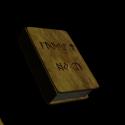 |
 |
| Magic is the most important aspect of Ascension. Each
guild teaches certain spells to its members. As a character learns
new spells from joined guilds, they will be added to the character’s Spellbook,
making them available for the player to ‘cast’. A player can also cast a spell
by using an item with magical properties (e.g. ‘Potion of
Sight’). When a player casts a spell from their Spellbook, some spell points
will be used. The number of spell points that a spell will take depends
on the level of the spell and the power of the character. A more powerful
spell will require more spell points to cast. As you advance in the guild,
lower level spells will take fewer spell points, allowing you to cast them
more often. As with hit points, when in the City, your spell points will be restored
to their maximum capacity if you reenter the dungeon (with a penalty of aging),
rest at the fountain, or make a level in a guild.
The maximum amount of spell points a character can have is based on the
character’s natural Intelligence and Wisdom, although certain items can temporarily increase
a character’s spell points beyond this maximum. A character cannot cast a
spell if they do not have enough spell points.
The effectiveness of a spell is based on the “Spell Level” at which it’s cast. A character will cast a spell at their Spell Level in the guild that taught them the spell (equal to half their level in that guild, rounded up). If a character is a member of several guilds that offer the same spell, then the best guild will always be used: A level 50 Mage who is also a level 20 Warlock will cast a shared spell (e.g. ‘Life Shatter’) using their Magi Spell Level (since it is higher than their Warlock Spell Level). However, if the Warlocks’ guild can cast the spell for less points than the Magi’s guild, the lowest points will be used! When using the special abilities of an item to cast a spell, the highest Spell Level from all of the guilds which have access to the spell is used, unless the item casts a spell at a specific level (which can be found out by getting complete information on an item). NOTE: You can teach your guild new and more powerful spells by finding certain items (e.g. Treatises, Grimoires) in the dungeon and turning them in to the guild! Example
of Casting a Spell
To cast a spell on another character, such as ‘Heal’ or ‘Resist Poison’, the character must be in the current area. For more information, please refer to the Parties section in this Online Information System. Some monsters have partial or total immunity to certain spells, while some have complete immunity to all spells. For example, fire spells won’t work on most dragons. The higher the level of the character, the better the chance of affecting a monster with partial immunity to magic (total immunity can never be negated). Spell Power
& Damage
There really isn’t an equation to tell exactly how many points of damage a certain spell (say 30/15) will do when cast at a given Spell Level since there can be too many other variables involved (e.g. target’s resistance, size, etc.). The player generally must learn by experience and get a ‘feel’ for how the Base/Level Modifier system works. Base Level,
Required Stats and Description
This information would mean that a Sorcerer will learn the spell at Spell Level 3, a Cleric will learns it at 6, while Explorers and Warlocks won’t learn it until they reach Spell Level 9 (guild level 17). In general, Guilds that specialize in spells (e.g. Clerics and Heal spells) will learn a spell before any other guild that has access to the spell. Note that if a spell has different Base Level in two guilds, the relative difference in spell cost between the two guilds (at the same Spell Level) will usually be even greater (i.e. a higher Base Level means you’ll also need a higher Spell Level to reach the minimum cost)! Required Stats
Spell Information &
Description
This means that if the spell was cast on group #1 of 12 monsters, it could potentially kill up to 4 monsters from that group before moving on to group #2 (which is the next monster group if it exists). Of course, monsters that are out of range will not be harmed. If you click on the small ‘turn page’ graphic (at lower left corner of Misc. Info Pane) when viewing the spell information, you will see a brief description of the spell so the caster has a better idea of exactly what it does and where the spell came from. Spell Classes
Keep in mind that you will have to experiment with the spells to figure out exactly what they do. Some spells will not be very effective when you are first able to cast them, but will improve as your character becomes more powerful (gains levels). |